#Chilean literature
Text
And when the sadness I hate comes / to knock at your door, / dile que yo te espero / and when loneliness wants you to change / the ring in which my name is written, / tell loneliness to talk with me, / that I had to go away / because I am a soldier, / and that there where I am, / under rain or under / fire, / amor mío, te espero.
-The Captain’s Verses (1952) by Pablo Neruda
La Carte En El Camino / Letter on the Road
#pablo neruda#the captain’s verses#love poems#1952#chilean literature#literature#poetry#quotes#words#my love I wait for you#los versos del capitán
15 notes
·
View notes
Text
The boy who went madly in love, by Enrique Barrios (1915)
Prologue:
Have you ever heard a bird singing at night?
Sometimes a sliver of golden moonlight spills between the mysterious foliage, reaches the branch where the little bird is nestled, and wakes her up. The bird may think is the dawn, but it's not. And still, she sings.
Then, if the little bird is poised and strong, once she discovers that it was all a trick, she will bury her beak between her feathers and fall asleep once more.
However, there are a lot of different birds. Restless and fragile, to whom the sliver of moonlight had put under a spell. Who after singing, stunned, they jump and try to fly. But as the sun has not risen yet, they become lost in the darkness, or they drown in the lake illuminated by a pale golden sliver of light, or they get their chests embedded with the thorns of a rose bush which could have heard their bests songs and ignite their most delirious joys in the morning.
What is the poisonous beam of light that awake some souls in the night, robs them of dawn and drowns them in an existence of darkness?
I am about to reveal you the secret of a boy who went madly in love.
Outside of myself, no one —not even his mother, turned into his slave— ever possessed the truth behind the madness of this child. I would not reveal yet how this painful and naïve notebook fell into my hands. I can only tell you that I am publishing this because it cannot hurt anyone anymore. I respected for years the secret of that child. Of that little bird who sang in the night and lost his dawn. Fate brought this notebook to me, and I have kept it dutifully. With the respect a saddened and sentimental child deserves. A victim of the poisonous beam that sheds a light into hearts before their time and throws them into that blazing and dark vortex; sweet and terrible, called love.
#english translation#latin american literature#latam literature#latam author#chilean author#autor chileno#literatura latinoamericana#literatura chilena#Enrique Barrios#Traducción al inglés#spanish to english#the boy who went madly in love (1915)#el niño que enloqueció de amor (1915)#chilean literature#translated literature
6 notes
·
View notes
Text
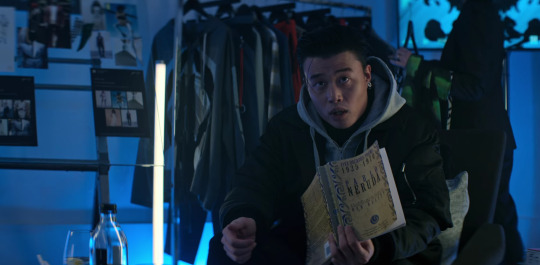
You S04E02 (Portrait of the Artist)
Book title: Five Decades: Poems 1925-1970 (1994) by Pablo Neruda
#aidan cheng#you#netflix you#you season 4#portrait of the artist#books in tv shows#five decades poems 1925 1970#pablo neruda#chilean literature
21 notes
·
View notes
Text
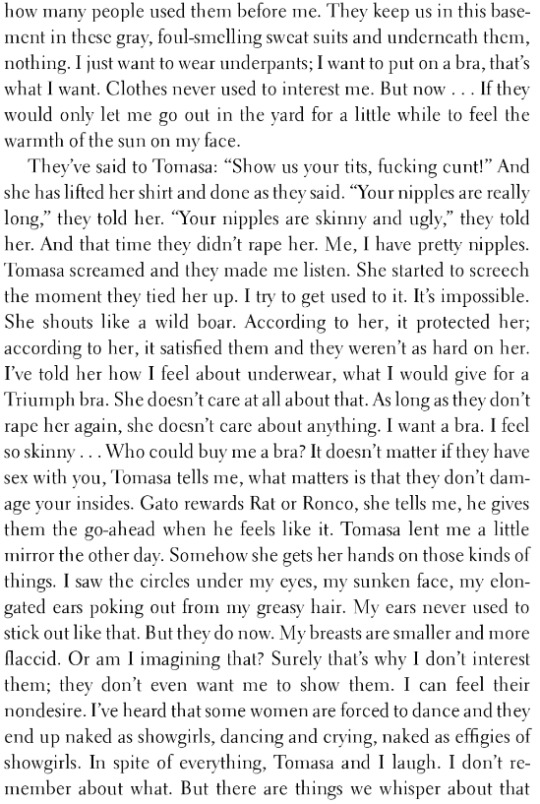
La Vida Doble p.35
Set in the darkest years of the Pinochet dictatorship, La Vida Doble is the story of Lorena, a leftist militant who arrives at a merciless turning point when every choice she confronts is impossible. Captured by agents of the Chilean repression, withstanding brutal torture to save her comrades, she must now either forsake the allegiances of motherhood or betray the political ideals to which she is deeply committed. While it is a novel it was written by the director of Chile's Museum of Memory and Human Rights and so based on extensive interviews of the real experiences of women prisoners.
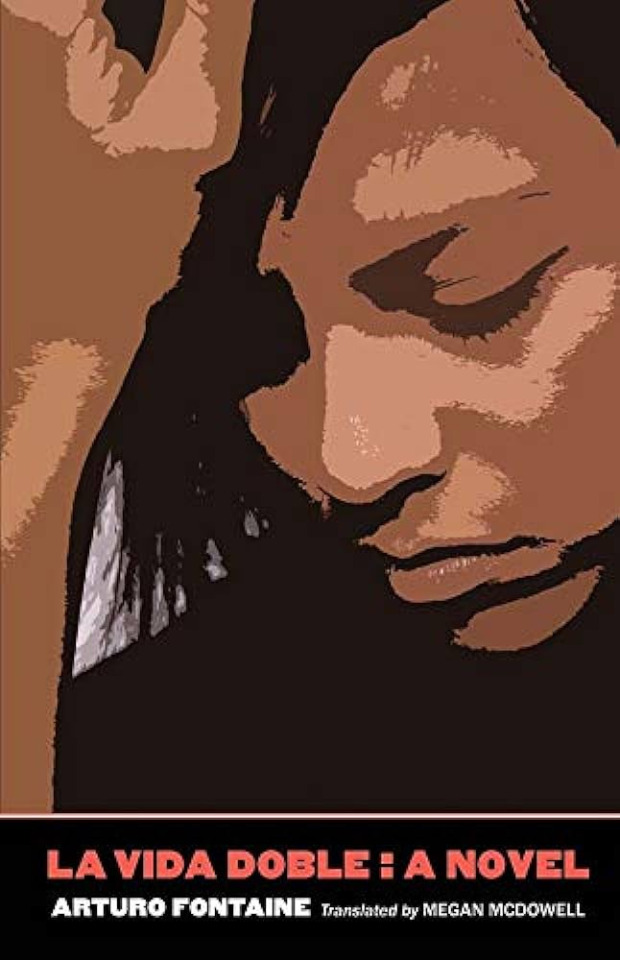
This short passage captures so many of the tactics of psychological warfare that the Junta used to adjust leftist women from their lives as revolutionaries to political prisoners to sexual slaves. Simple things like underwear became something women longed for. " I just want to wear underpants; I want to put on a bra, that’s what I want." As she says to her companera she would give anything for a Triumph bra. And Junta guards fully exploited women's lack of bras, and made crude insulting comments about their breasts. This 1974 ad for Triumph bras, gives some of its connotations as a Swiss luxury brand, and why the Junta might see it as a triumph that an ex-militant now longs for one. "I’ve told her how I feel about underwear, what I would give for a Triumph bra. She doesn’t care at all about that. As long as they don’t rape her again, she doesn’t care about anything. I want a bra. I feel so skinny . . . Who could buy me a bra?"
Most disturbing is the final lines about how "some women are forced to dance and they end up naked as showgirls, dancing and crying, naked as effigies of showgirls". It was the ultimate form of degradation to turn revolutionary enemies into dancing strippers for their Fascist worst enemies. In this circumstance where underwear became a precious commodity for women prisoners, for comfort and their basic feminine needs. Women became desperate for any bra and underpants at all, and so were willing to wear the sexy, skimpy stripper bra and tangas, the Junta guards mockingly provided. "They end up naked". They started off clothed, and it was the process of undressing, stripping like showgirls that Junta guards found so amusing on revolutionary women. Despite the macabre scene of women dancing and crying, the tears of traumatized victims won them no sympathy from guards. Turning once dangerous women into entertainment was their cruel way of showing off that they were no longer a threat to Pinochet.
The translator Megan McDowell, in an interview asked the author, about how in the Chilean context, Communism had a much more inspiring idealistic background than most North Americans are familiar with, and it is a tragic contrast with what these inspiring idealistic women were reduced to.
MMcD: A related question—in the U.S., words like “Socialism,” “Communism,” and “Revolution” have a different resonance than they do in Chile. Even for people on the left, “communism” is associated with experiences of dictatorship and repression, and doesn’t have romantic or idealistic associations that it does for Lorena, or that people in Chile are more aware of, even if they don’t share them; there is little history of socialist ideas or movements in the U.S. Is there anything in particular you think your North American readers should be aware of about Chile’s history as they read your book?
AF: Not much, really. Lorena makes things understood as they need to be understood; for example, what it means to her to belong to a radical revolutionary movement that tries to win a utopia through armed struggle, one that demands from her the complete sacrifice of her life. There have been so many movements like that, and there always will be. Whether the inspiration comes from Che Guevara, or the movement’s name is this or that, or whatever the specific content of the project for a new society, these are not essential matters. The willingness to sacrifice oneself for something that feels huge, almost impossible, is always a human possibility. The Islamic fundamentalists are painful reminders of this. Furthermore, the immediate enemy is brutal dictatorship. But the use of torture to get information out of terrorist groups is something that has happened in many countries, even in some democratic ones and not too long ago . . . I would like for the novel to show, in contrast to the film Zero Dark Thirty, the victim’s perspective, the way his or her identity as a person is gradually torn to shreds.
5 notes
·
View notes
Photo

This month, I’m featuring books in translation from Chile!
In these books: A woman is temporarily (or maybe permanently) blind and deals with dismissal and helplessness and a rising fury. An old queen past her best days of drag and splendor takes a break from cruising to help out the resistance because she has a crush on a young rebel leader. A young child accompanies her salesman father as he sells hardware supplies in Pinochet-era Chile.
There are so many good books on this list, including some new favorites. Check it out!
#books in translation#translated literature#chilean literature#wit month#my tender matador#seeing red#gabriela mistral
27 notes
·
View notes
Text

Luis Sepúlveda Calfucura was a Chilean writer and journalist. Was born on October 4, 1949.
“The only ones who fly are the one who dare to fly.”
Luis Sepúlveda
#luis sepúlveda#chilean literature#latin american literature#literary quotes#books#literature quotes#reading#books and reading#quotes#booklr#bookish#booksbooksbooks#prose#literature#writing
1 note
·
View note
Text
I think of the poets who died under torture, who died of AIDS, or overdosed, all those who believed in a Latin American paradise and died in a Latin American hell. I think of their works, which may, perhaps, show the Left a way out of the pit of shame and futility. I think of our useless pointy heads and the abominable death of Isaac Babel.
Roberto Bolaño, Dance Card
2 notes
·
View notes
Video
youtube
Sonnet XXVII: "Naked, you are simple as one of your hands," by Pablo Neruda
#youtube#Pablo Neruda. Neruda love poem#naked poetry#poetry video#surrealist poets#Chilean literature
2 notes
·
View notes
Photo
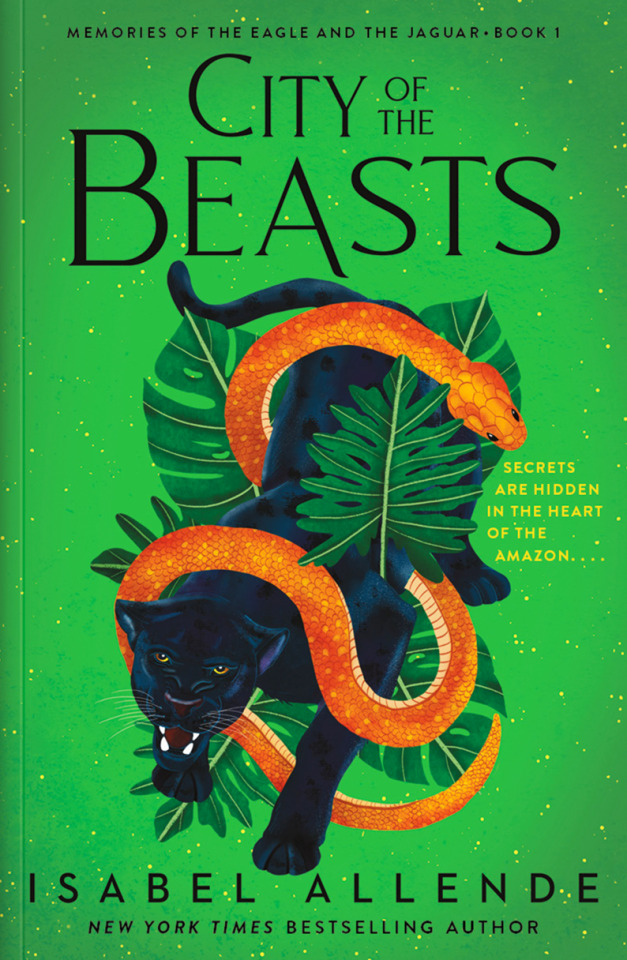
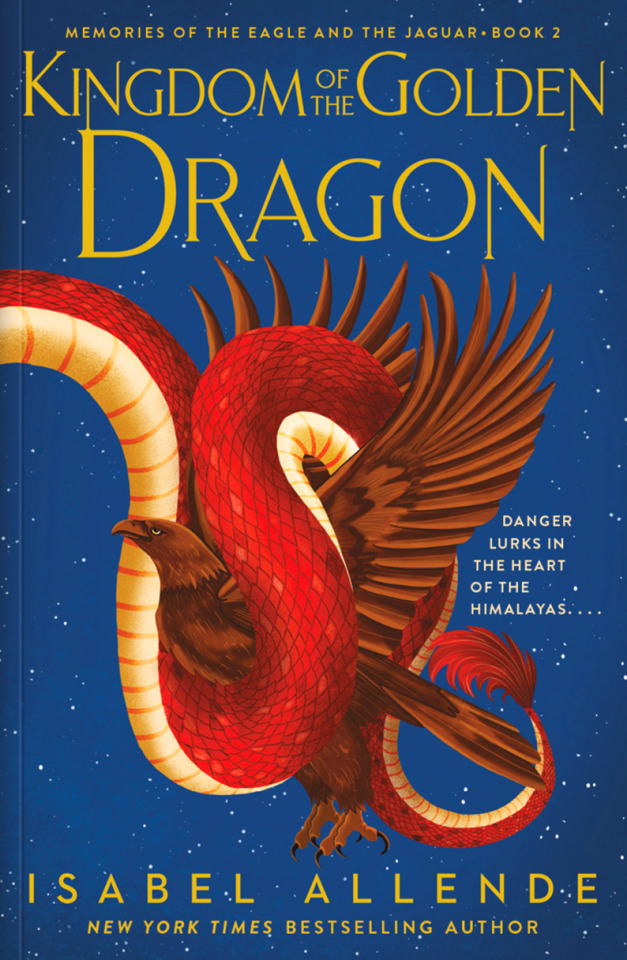

Micaela Alcaino’s illustrated book covers for Isabel Allende’s Memories of the Eagle and the Jaguar (City of the Beasts, Kingdom of the Golden Dragon, Forest of the Pygmies).
#chilean literature#book covers#isabel allende#micaela alcaino#memories of the eagle and jaguar#city of the beasts#kingdom of the golden dragon#forest of the pygmies
6 notes
·
View notes
Text
“I can’t sleep at night. I feel as if I’m choking. I get up and walk around the garden and then I walk inside the house. I go to my sister-in-law’s room and put my ear to her door. Sometimes I tiptoe in and watch her while she sleeps. She looks like an angel. I want to climb into bed with her and feel the warmth of her skin and her gentle breathing.”
Isabel Allende, The House of the Spirits (trans. Magda Bogin)
0 notes
Text
Mi reseña de "Indócil" obra poética reunida de Eugenia Brito publicada por Ediciones Libros del Cardo :)
#omnivoracultural#reseña#reseña literaria#Eugenia Brito#literatura chilena#poesia chilena#poesia politica#poesia feminista#Chilean literature#Chilean poetry
1 note
·
View note
Text
This woman who was so down to earth and practical in all other aspects of life sublimated her childhood passion and lived it tragically. She fed it with fantasies, idealized it, savagely defended it, stripped it of its prosaic truth, and turned it into the kind of love one found in novels.
Isabel Allende, from The House of the Spirits (trans. Magda Bogin)
0 notes
Text
The boy who went madly in love, by Enrique Barrios (1915)
Chapter 5
My brothers don't like me. They never invite me to play with them because they say I don't know how. And they are right, I don't understand their games, and I don't like to play them. I don't like to play with other boys because I've noticed I'm very different from them. They forget themselves and everything else and can play freely. While I can't do that, and never pay attention to the games and I always lose and make my team lose too.
That's why my grandmother says I'm a poor creature, that I'm too thin and too pale, that my legs look like sticks and that she feels sorry for me. Well, I feel sorry for her! her hands are all vein-y, her face is the same colour as dry dirt, her lips are pale and her teeth yellow, she doesn't know how to play the piano like mom, and all she does all day is fight with the servants.
If I was grown up, I would do a lot of different things. And what if I'm a sensitive boy? why should anyone care? Furthermore, I've always been like this; except that before I only felt sad in occasions, in random days. But nowadays I tend to feel much more sadness, and it's because of Angélica, but it's a sadness that I like.
When will she be back? My Angélica of my soul...! I thought I would be able to write in this notebook every sweet nothing that I dedicate to her in my mind; but now I see that even if no one reads this, it's embarrassing to externalise those words I dedicate in thought alone to her or to her portrait.
Last night, before going to sleep, I stole her portrait from the living room. I brought it to my bed, and I kept kissing it, and I told it all the things I'm too embarrassed to write here. I wanted to keep it forever in my notebook, but suddenly I got too scared of the thought that someone might find out that it's missing, so I got up in my pyjamas and returned it to the family album. Of course! Someone might have found out it was me because as soon as they asked, I would have gotten too nervous, and my face would have given it away.
Tomorrow is Sunday, maybe I'll see her at church, and if I don't, I'm going to ask my mom if we can go visit my cousins. Angélica goes there on Sunday's afternoons, and I can stay in the balcony the whole afternoon with her and my auntie Carmencita, who loves me a lot because she says I'm very affectionate. She is kind and very pretty, her hands are soft and chubby, and she reads me stories with her calm and soft voice.
#english translation#latin american literature#latam literature#latam author#chilean author#autor chileno#literatura latinoamericana#literatura chilena#Enrique Barrios#Traducción al inglés#spanish to english#the boy who went madly in love (1915)#el niño que enloqueció de amor (1915)#chilean literature#translated literature
3 notes
·
View notes
Text
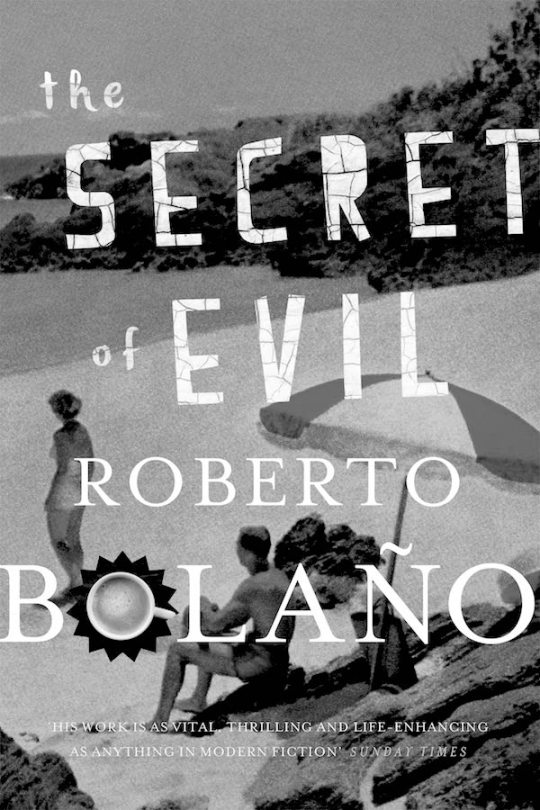
Currently Reading
Roberto Bolaño
THE SECRET OF EVIL
[El Secreto del Mal]
1 note
·
View note
Photo
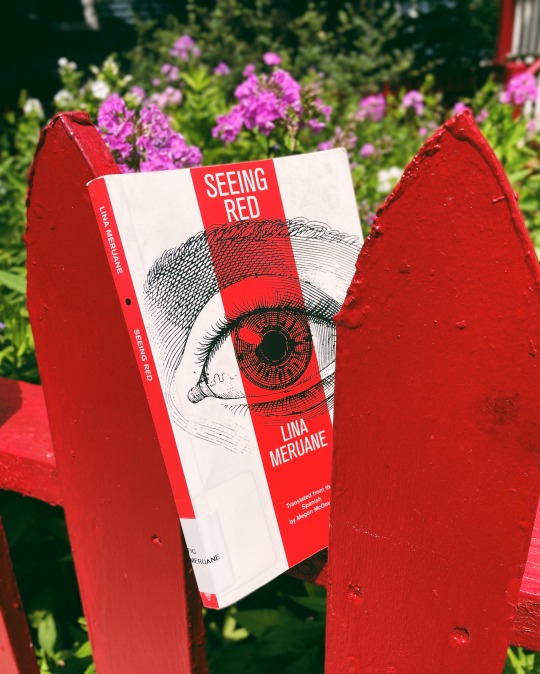
Seeing Red by Lina Meruane, translated by Megan McDowell, was an unexpected hit straight to the stomach. It is a powerful short novel about a woman who loses her sight after the blood vessels in her eyes burst. She’s been sick for a long time, forced to live in a constant state of dread and care, and one day at a party, it happens. The blood floods her eyes, and she quickly becomes completely dependent on her relatively new boyfriend, and then also on her doctor parents on her brief visit home to Chile.
The book is based in Meruane’s own real experiences and health issues. It’s dark and perfectly encapsulates the horror of being dependent on people who aren’t taking you seriously, of medical dismissal, of friends who don’t know what to do and want to flee, of overbearing family, of people who think they know what’s best for you. The protagonist is mired in the desperation of wanting someone to recognize how dire her situation is, unnerved by the unshakeable-ness of her doctor who never remembers her name, annoyed by her boyfriend’s complaints and avoidance. She finds herself unraveling under the weight of blindness, of helplessness, of dismissal, becoming angry, becoming obsessed with other people’s eyes, being changed by the harrowing fear and complete loss of control.
Anyone who has had experience with medical fear and dismissal will recognize the paralyzing panic and rushes of anger that fill the protagonist up as she tries to make people understand the gravity of what’s happening to her, as she confronts a new and very uncertain future.
Content warnings for r-slur, ableism, medical dismissal and trauma, chronic illness, fatphobia, suicidal ideation, transphobia/misgendering.
#seeing red#lina meruane#books in translation#women in translation#chilean literature#chronic illness#chronic illness reads#my book reviews
18 notes
·
View notes
Text
Me parece bello que no se encuentren . Seguir simplemente sus vidas,tan distintas, hasta el presente y aproximarlas de a poco: dos trayectos paralelos que no llegan a juntarse. Pero esa novela debería escribirla alguien más. A mí me gustaría leerla. porque en ña novela que quiero escribir ellos se encuentran. Necesito que se encuentren
Alejando Zambra- formas de volver a casa
1 note
·
View note